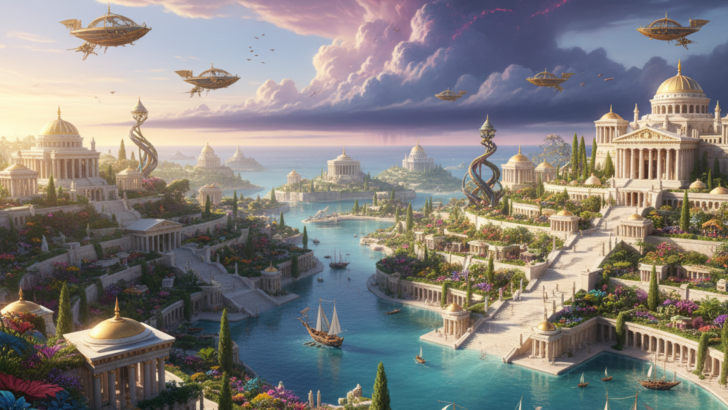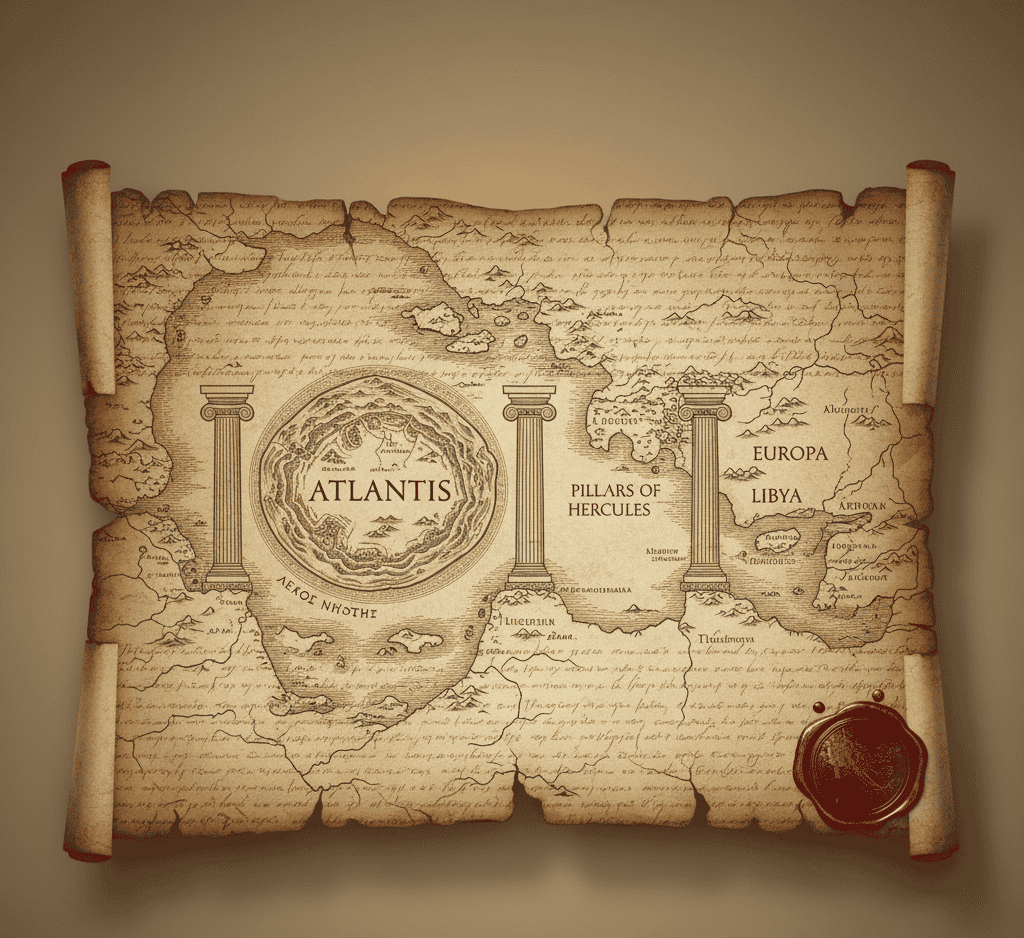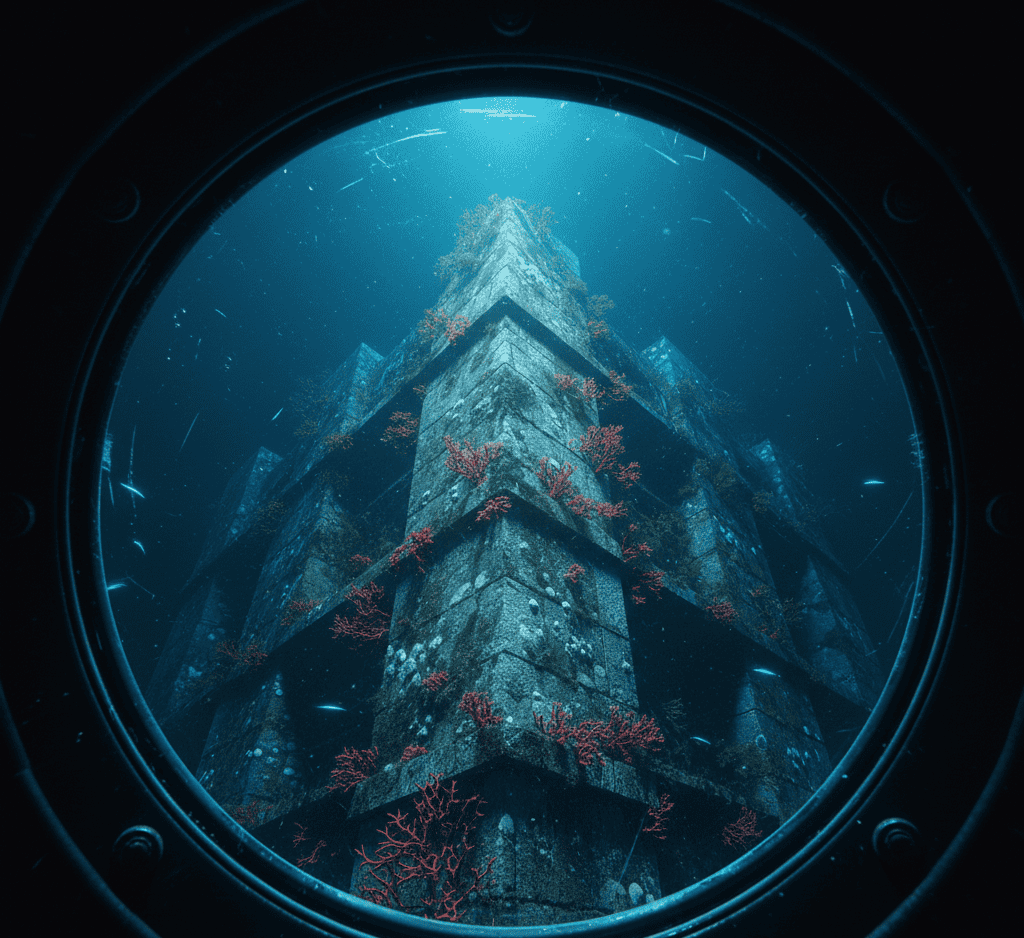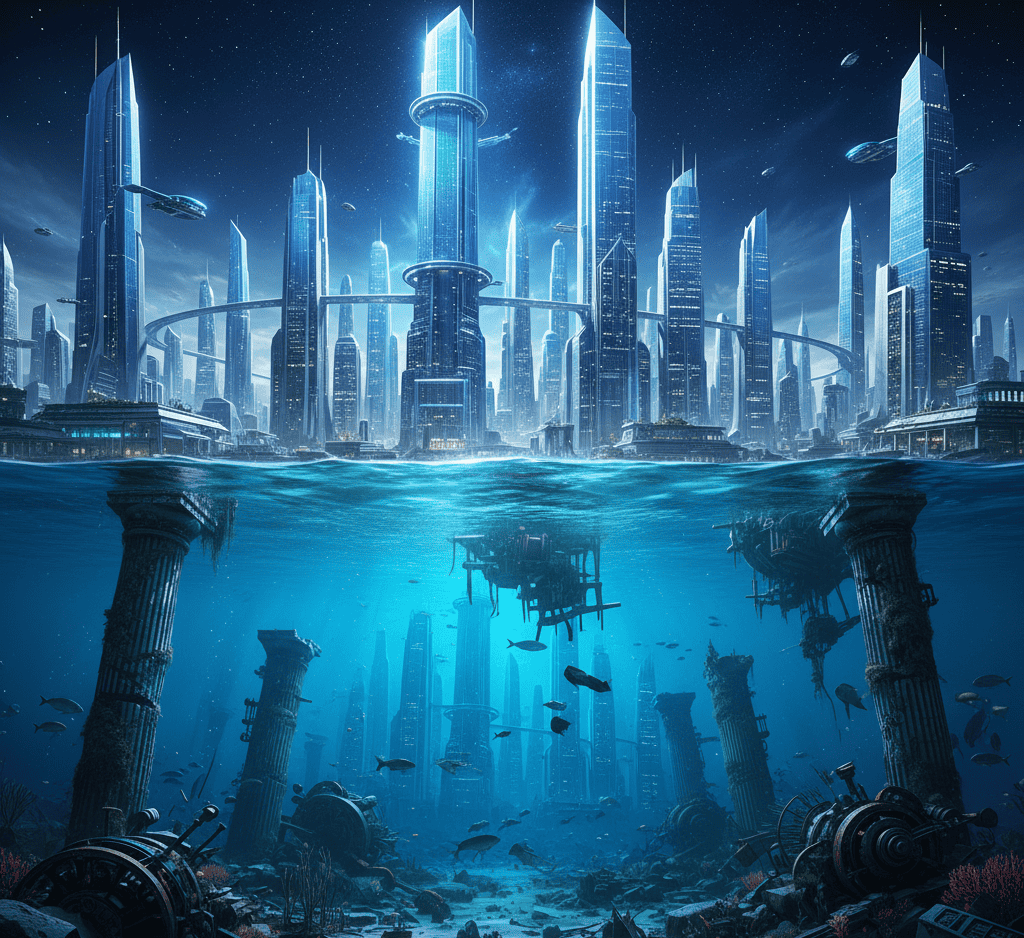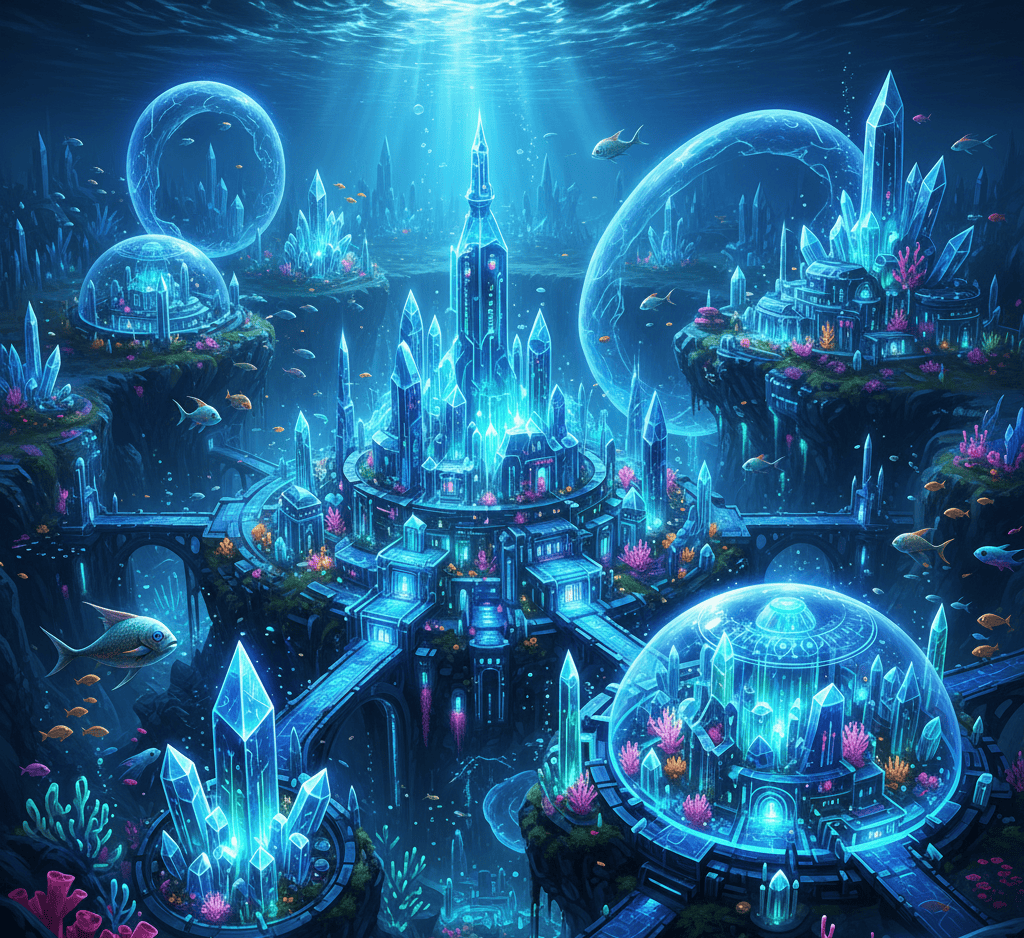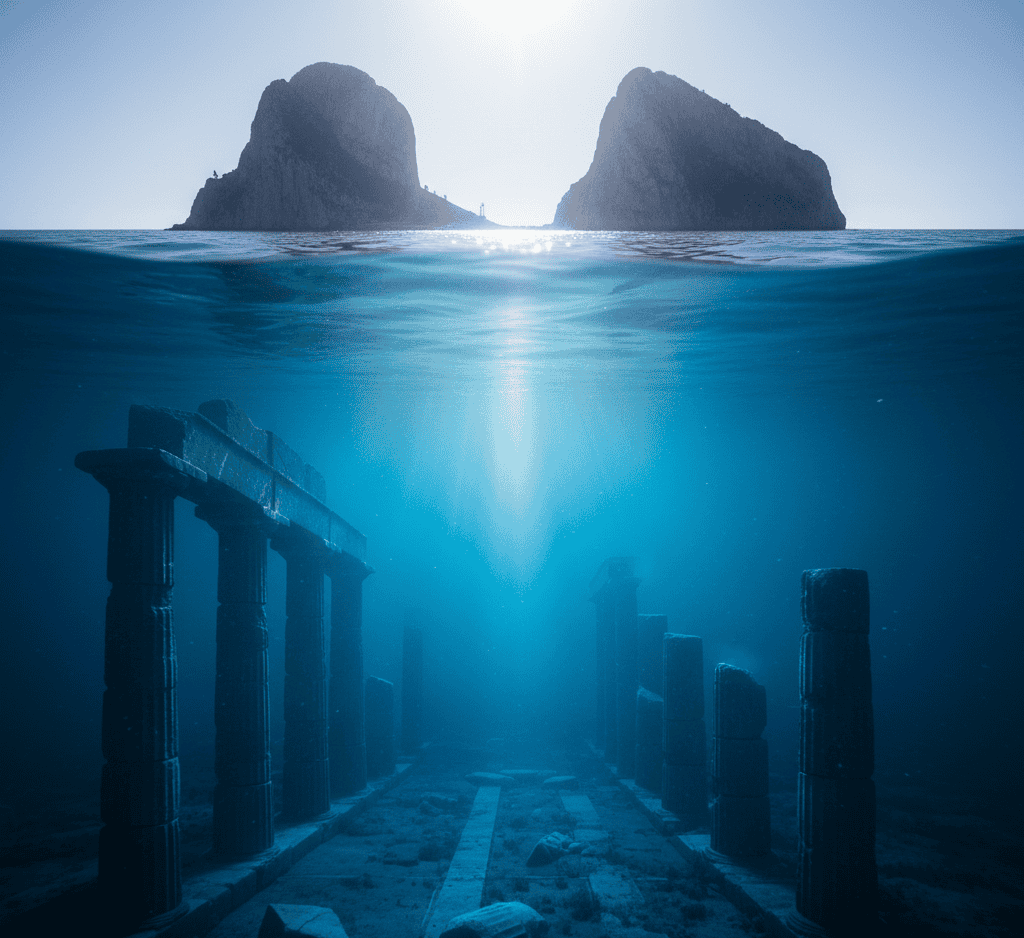For thousands of years, people have searched for a city that may never have existed.
Atlantis was the shining island that rose from the sea and vanished in a single night, and has become one of the greatest mysteries of all time.
Philosophers, explorers, and dreamers have chased its legend across maps and oceans, convinced that somewhere beneath the waves lies proof of a forgotten civilization.
But what if Atlantis was never truly lost? What if it’s not gone at all, only waiting – hidden by time, memory, or maybe even choice?
Some believe Atlantis still exists, watching humanity from the depths, waiting for us to be ready to understand it again.
A City Born from a Story
The tale of Atlantis began with a philosopher, not a pirate or an explorer. Around 360 BC, Plato wrote about a grand island nation beyond the Pillars of Hercules – what we now call the Strait of Gibraltar.
He described a powerful and advanced society blessed by the gods, rich in wisdom and beauty. But pride led them astray.
The people of Atlantis became greedy and arrogant, and as punishment, the gods sent earthquakes and floods that swallowed the city whole.
Many scholars say Plato never meant for anyone to take the story literally. It was meant to be a lesson about moral decay, not a map to treasure.
Yet, the human imagination doesn’t let go so easily. People wanted to believe Atlantis was real.
They wanted to think there was once a place where knowledge and peace thrived, and maybe could again.
Over the centuries, everyone from archaeologists to psychics has claimed to know where Atlantis sank.
Theories have placed it in the Mediterranean, under Antarctica, off the coast of Spain, and even beneath the Bermuda Triangle.
Each idea adds new details – crystal towers, flying machines, and technology so advanced it seemed like magic.
Atlantis stopped being just a story. It became a symbol of everything humanity once was or could be.
Clues Hidden Beneath the Waves
The search for Atlantis never really stopped. Every few years, someone claims to have found traces of it.
Satellite images show mysterious shapes on the ocean floor. Divers return from deep-sea expeditions with tales of massive stone structures buried in coral.
Most of these “discoveries” turn out to be natural formations, but that never kills the excitement.
One popular theory places Atlantis near the island of Santorini, in Greece. Around 1600 BC, a volcanic eruption destroyed the Minoan civilization there, leaving behind ruins that seem almost frozen in time.
Others point to the Azores in the Atlantic Ocean, a cluster of islands exactly where Plato said Atlantis once stood.
Some even argue that ancient Egyptian texts contain hidden references to travelers from a sunken land who shared their knowledge with the world.
Modern science is skeptical, of course. But every time, new technology allows us to explore a little deeper, whether through sonar, submarines, or AI mapping.
What if we just haven’t looked in the right place yet? What if the sea has been keeping its greatest secret all along?
And then there’s the more mystical theory – the one that says Atlantis never sank at all.
It simply shifted dimensions, slipping into a parallel world or spiritual realm where it continues to exist beyond our sight.
According to believers, Atlantis isn’t lost; it’s waiting for humanity to rise high enough in spirit to find it again.
The City That Mirrors Us
Even if Atlantis was never real in the way we think of “real,” the story reveals something deeply true about us.
It reflects our desire for perfection and our fear of losing it. Atlantis stands for the best and worst of humankind.
Its people were wise and powerful, but they grew arrogant and careless. They built wonders beyond imagination, yet forgot humility.
In many ways, Atlantis feels like a mirror held up to our own time. We, too, live in an age of great achievement and growing imbalance.
We reach for the stars but struggle to protect our own oceans. We crave knowledge but risk drowning in it.
When people say Atlantis is waiting, maybe what they mean is that its lesson still echoes through us.
Some modern philosophers and spiritual thinkers suggest that “finding Atlantis” isn’t about maps or sonar scans.
It’s about rediscovering the harmony that legend describes. A balance between technology and nature, between ambition and respect.
If Atlantis is waiting, perhaps it’s waiting within us, urging us to remember what we once knew before pride sank our metaphorical island.
Why the Legend Still Lives
No matter how many centuries pass, Atlantis refuses to fade away. Part of its power lies in how adaptable it is.
It’s a myth that can belong to anyone. Scientists see it as an unsolved puzzle. Writers see it as a dream. Mystics see it as a spiritual truth.
Hollywood movies, books, and even video games keep reinventing it – a lost empire under glass domes, a futuristic city powered by crystals, a utopia hidden beneath the sea.
The idea keeps evolving because it speaks to something timeless: the hope that not everything beautiful has been lost forever.
In an age of discovery, when satellites can map the surface of Mars but not the deepest trenches of Earth’s oceans, Atlantis still represents mystery.
It’s a reminder that there are places we haven’t reached, both on the planet and in ourselves.
Maybe we need myths like Atlantis to keep us curious—to make sure we never stop exploring, even when logic says we should.
The City Beyond the Horizon
So, is Atlantis gone or simply waiting for us to see it again? The answer might depend on what you believe.
Maybe it lies buried beneath miles of sand and saltwater, its marble columns wrapped in coral and silence.
Maybe it exists in another plane, hidden behind the veil of time. Or maybe it was never a place at all, but a message about what happens when wisdom turns to arrogance.
What makes Atlantis eternal isn’t proof. It’s faith. Faith that something extraordinary once existed, and might again.
Every story about it, from Plato’s writings to modern retellings, carries the same heartbeat of hope. That humanity can rise, fall, and rise once more.
Perhaps one day, the ocean will give up its secret. Or perhaps the secret is that we were never meant to find it, only to remember it.
Until then, the waves will keep their silence, and the legend will keep breathing beneath them. Atlantis may be hidden, but it is not gone.
It waits, patient and eternal, just beyond the horizon where truth and imagination meet, and where all great stories begin.

Siempre sentí una fuerte conexión con lo Divino desde mi nacimiento. Como autora y mentora, mi misión es ayudar a los demás a encontrar el amor, la felicidad y la fuerza interior en los momentos más oscuros.

